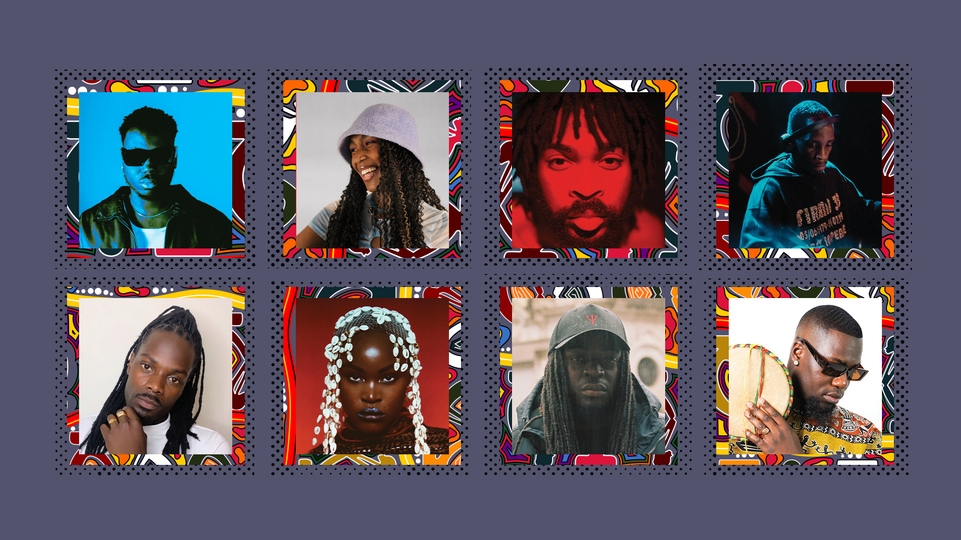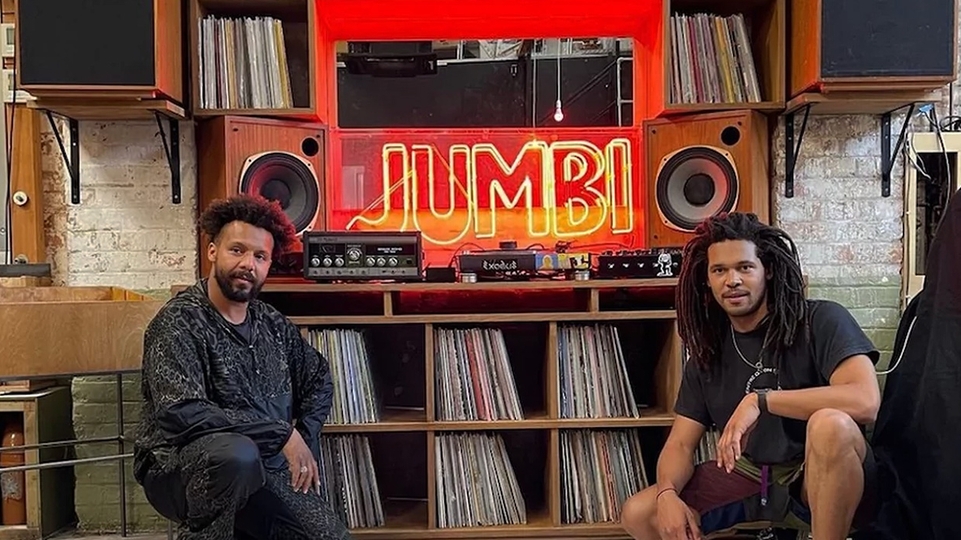.jpg?itok=ZsdhFq_r)
The unrelenting strength of Kuduro, Lisbon's most exciting sound
Over the last decade, the Afro-Portuguese sound of Kuduro has travelled from the bairros of Lisbon to a global audience. DJ Mag's Anna Cafolla meets with the genre's innovators, to find out how the sound has captured imaginations worldwide
The Portuguese word ‘desenrascanço’ doesn’t have a direct English translation, but it can be roughly described as an ability to untangle oneself from a difficult situation. To travel to Lisbon, where Kuduro music has blossomed, is to see and hear ‘desenrascanço’ in action. “We are the pioneers, and new ones are coming,” says Kuduro innovator DJ Marfox. “It needs to travel, to be shown respect and love, to be the defining Lisbon sound.” 2019 has been another busy year for the Afro-Portuguese electronic genre. That's down to the work of a core group of producers and DJs, and one record label devoted to them.
Many of those who have shaped Kuduro were raised in Lisbon neighbourhoods known as ‘bairros’ – Bairro da Portela, Quinta do Mocho, Bairro do Pendão, and western municipality Oeiras’ Bairro do Pombal. As the children of first and second generation immigrants from Portuguese colonies – Angola, Cape Verde, São Tomé and Príncipe, Mozambique – many of their families fled civil war, extreme poverty, and conflict. Often placed in substandard housing on the city’s far edges, opportunities were scarce, but some found solace in the sounds of home. High-rise metal balconies and guerrilla parties in bungalows reverberated with ‘Batida’ (‘Beats’): an umbrella term-as-genre that ensnares the dark glitches of Tarraxo, the slow sensuality of Kizomba or Tarrachinha, and the dizzying Kuduro.
DJ Marfox grew up in Quinta do Mocho. He remembers hearing “the sounds of those searching for a better life” as a child in the early ’90s, listening to music from Brazil, Portugal, and India. “I relate my personal and cultural identity to Kuduro, and Kuduro to the local Lisbon neighbourhoods – it grew up here, too,” says Marfox. He tells us how Kuduro morphed: on its travels from Angola to Portugal, shedding the MCs and singers in favour of dominating, thumping instrumentals; beats designed on rudimentary programs like Fruity Loops for full-bodied dancing, without inhibitions. Translated, Kuduro literally means ‘Hard ass’.
In 2005, he co-founded DJs Do Guetto – alongside DJ Pausas, DJ Fofuxo, Nervoso, and DJ Jesse – and the crew pushed a rebellious, fast-paced strain of the genre. He compares it to the early days of hip-hop in New York, with its wild, high-stakes competitions and DIY parties. “Kuduro is the beat of my heart and in making others a part of it, it beats harder,” Marfox says passionately. “Kids in my neighbourhood tell me every day that they feel their dreams are possible because of what I’ve been able to do.”


DJs Do Guetto crew’s 2006 compilation, ‘DJ Do Guetto Vol. 1’, is Kuduro’s landmark release, the mixtape then-circulating the bairros on personal stereos and its makers dominating block parties. “It changed everything for us and the community,” says Marfox. “We made being a producer something they could really consider to be.” Indeed, many of those who came up after Marfox adopted the ‘fox’ suffix in their artist names in homage – DJ N**** Fox Lilocox, Karfox, Liofox, Dadifox – and creative pockets sprung up elsewhere in the bairros.
It was in 2010 that Príncipe, a Lisbon collective of record shop heads and promoters focused on contemporary local music, first encountered Kuduro. They were working with rappers in the city, one of whom had beats made by a young Marfox. After Príncipe approached him, he introduced them to the wider Batida-making set and invited them to parties. Príncipe released Marfox’s debut EP, ‘Eu Sei Quem Sou’ (‘I Know Who I Am’), in 2011 – and its frenetic sound, with octave-jumping harmonies, made a powerful statement. “I wasn’t getting the recognition in Lisbon and they said it needed to reach the rest of the world,” says Marfox. “Príncipe are my mentors – they told me the world needs to know Kuduro.”
“The music helped us, and we wanted to help the music,” Príncipe co-founder José Moura explains. “We didn’t plan to start a Kuduro label, but we found each other.” Príncipe records soon populated shops like Berlin’s ANOST, Amsterdam’s Clone, Japan’s Jet Set, and Glasgow’s Rubadub. An overarching aim of Príncipe has been to elevate the unheard, without ghettoising or fetishising. “Kuduro wasn’t a part of the Portuguese music circuit outside of these neighbourhoods,” says Moura. “Artists were going straight from their home parties to DJ in Holland or France. We believed that we could help transport it and get it the respect it deserved locally.”
To make this happen, the label started its own club night, Noite Príncipe, in 2012. It’s hosted in Lisbon’s MusicBox, a cavernous Cais do Sodré spot under the city archways. “I’ve been doing it for seven years, it’s our vision, our baby!” says Marfox. “The club night became a focal point for us and the producers,” agrees Moura. “It was important for us to deliver, to gain that trust.” With Marfox’s help in curating the line-ups, the relationships between the label and the artists have grown intimate. Musicians began incorporating Príncipe and Musicbox into the titles of their tracks, and new artists would often make their debuts at the party. “Kuduro music was just pouring out,” says Moura.

“There’s supporters rooting for the culture in Europe, Africa, the Americas, and Asia. I think this can only be positive. There is a genuine commitment, in our community, to other communities that have gotten to know our culture. We keep sharing the love for Kuduro to whoever wants to get to know it.”
Interest from outside the artists’ estates grew. Students, tourists, and other locals were encountering Kuduro in a once “seedy” riverside area, rejuvenated by new clubs, bars, and cafes, and home to well-known venues Lux and B.Leza. Slowly, Moura witnessed the Noite Príncipe crowd become more mixed. There was a gradual divestment of racist notions that they felt were inhibiting the scene, and ravers from the bairros started coming to Noite Príncipe.
“It was important for us to make a space for dancers from the neighbourhoods this music was coming from, and not just downtown hipsters and art world people,” says Moura. He says there’s still a lack of love for Kuduro in Portugal outside of Noite Príncipe and smaller, grassroots parties, with international clubs doing more to celebrate the artists. “There is still no established major scene celebrating Kuduro outside of MusicBox, but we hope to change that.” This January, they hosted a colossal five-venue, two-city party – MusicBox, Lounge, Damas, and ZDB in Lisbon, and Pérola Negra in Porto – to celebrate their seventh birthday.
“For a long time, [Kuduro] has been seen here as troublesome, ghetto music – not polished or glamorous,” continues Moura. “People feared the bairros, associated them with guns, gangs, and crime. Artists like Nervoso were banned from certain clubs. DJ Maboku told me he was about to give up when we approached him, he just couldn’t get his music to go anywhere.” “It was just ignored as black music,” agrees Marfox, “but people are much more open-minded [now]. I hear it in more clubs here. The community is spreading.”
Elevating the artists has meant offering holistic guidance and support, too. Moura details how the label supported DJ N**** Fox, arranging legal papers for him after he was denied entry to the UK three times while on tour. “More and more people [worldwide] have been identifying with its sonics and attitude,” says DJ N**** Fox. His 2013 Príncipe debut, the ‘O Meu Estilo’ EP, is a bombshell: South African snares meld with electro-stung basslines, syncopated percussion, and careening rhythms, stretching the genre’s already elastic boundaries. “It was a key label moment,” asserts Moura. “Kuduro is urgent, it’s about accepting the other,” continues DJ N**** Fox. “It’s about class approximation, the demystification of [Lisbon’s] bairro culture. Kuduro speaks for itself, and intervenes for itself, in the communities.”
As Maduro says, international recognition for Kuduro has long trumped local validation. WARP has signed multiple records, like the 2015 ‘Cargaa’ EP series and DJ N**** Fox’s 2018 ‘CR NIO’ EP, and DJ N**** Fox took part in the recent WARP anniversary takeover of NTS Radio. Marfox can have clubbers beating holes in the ceiling of an indie venue in central Lisbon now, but one of his most personal, triumphant gigs to date was at the Museum of Modern Art (MoMA) in New York City.
Bradley Zero, the London-based DJ and founder of the Rhythm Section label and party, focused his 2019 XOYO club residency on elevating global music subcultures. This included a party with Príncipe and London label Night Slugs. In a recent profile with DJ Mag, Zero defined the label as a space for bringing exciting, innovative sounds outside of the norm; “finding new ways to transcend borders and cultures is what drives the discovery,” he told us, “not just doing the same thing over and over again.”
“My introduction to Kuduro was through Buraka Som Sistema,” Zero tells us now. Back in 2015, he had a hand in the African zouk and Kuduro group’s Boiler Room performances, and Lisbon-focused Boiler Room shows featuring Blacksea Nao Maya, NinOo, Maboku, and Firmeza. “I’m not an expert by any means, but as an enthusiastic bystander, I’m blown away by the rhythm, energy, and sheer completeness of the artform,” he says. “ With the UK generally leading the way in forward-thinking club sounds, from within Europe, it was so refreshing to see such a dynamic and self-contained scene [from Lisbon]. When I hosted Príncipe at XOYO, the energy was insane. I felt like I was eavesdropping on a Portuguese-Angolan wedding!”
“Kuduro has always been part of my life, and it was always listened to among friends and family,” says DJ N**** Fox. “To think that outside of our nucleus there could grow any sort of interest and curiosity – I get surprised of how my music sparks interest in so many people. The internet and Príncipe are the two main responsible forces for part of the success. Alone, we would never have made it.” The sounds of these producers continues to be picked up by international artists. At this past weekend’s Dekmantel festival in Amsterdam, Batu’s slippery, breakneck-speed set centred Kuduro with footwork and jungle, while San Francisco’s Only Now take inspiration from Kuduro’s furbile sounds on their own productions.


“Kuduro has listeners all over the world,” says producer and DJ Nidia. At 22 years old, she’s one of Príncipe’s younger artists, and the label’s first female solo act. Her 2017 album, ‘Nidia é Má, Nidia é Fudida’, was praised for its push-pull of spikier and softer sounds, and she tours often. “There’s supporters rooting for the culture in Europe, Africa, the Americas, and Asia,” she says. “I think this can only be positive. There is a genuine commitment, in our community, to other communities that have gotten to know our culture. We keep sharing the love [for Kuduro] to whoever wants to get to know it.”
Core and new artists continue to tour internationally. In September, The Jazz Cafe in London will host a Príncipe label night, with DJ Firmeza, DJ Lycox, and DJ Lilocox. Nidia is due to perform at Eurobeats Festival in Washington D.C this September and London’s Boiler Room Festival this October, and will join Marfox and Firmeza at Utrecht’s Le Guess Who? festival in November. DJ N**** Fox regularly performs in the US and Canada.
Today, the label remains headed up by the founders – José Moura, Nelson Gomes, André Ferreira, and Márcio Matos – and artists like DJ N**** Fox, Nidia, and Maboku are committed to a dynamic evolution of the genre. Nidia, who made her start in the all-women music and dance crew Kaninas Squad, laments the loss of Kuduristas (female singers and MCs), and hopes to see this element return.
PT, Niagara, and DJ N**** Fox infuse techno, house, electro, and disco. Niagara’s debut 2018 album, ‘Apologia’, nudges at ambient sounds, and there’s the sprightly, left-field work of Príncipe’s newest signee, 19 year old Puto Tito, with ‘Carregando a Vida Atrás das Costas’. “As long as we can discover different, personal music from outside of the current scenes that need to be heard, the label will keep going,” says Moura.
“I really hope that my work becomes part of that legacy, and wish that it stand as my own singular stylistic proposal - for whoever is coming in behind [me] to feel inspired to top it, be better, be different,” says DJ N**** Fox with fervour. “I hope it opens horizons and inspire new generations to find their purpose and meaning for their lives… to dignify our artists and their music, and show that it depends not only of our collective strength and solidarity, but also of each one of us to build a legacy worthy of what is our culture.”




